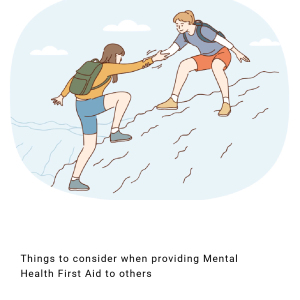Navigating mental health conversations
I was commissioned by Mental Health First Aid Australia to write “Things to Consider when Providing Mental Health First Aid to Others.” The article focused on the crucial importance of initiating mental health conversations to reach out and support those in need – and how to make that opportunity a positive one by avoiding common mistakes like:
- The you-centred conversation (drawing on too much lived experience and comparison)
- Using inappropriate language that may hurt or offend
- Minimising someone’s experience
- Trying to hard to fix the person or situation

To ensure that these conversations remained effective and supportive, the article provided key tips to avoid deterring people from disclosing their mental health challenges. One vital point was to avoid making the conversation too “you-centred,” where personal experiences overshadow the other person’s narrative. By maintaining a focus on the other person’s feelings and experiences, we can demonstrate genuine care and empathy. It also highlighted how the choice of words and expressions can significantly impact the overall tone and effectiveness of the conversation.
Minimising someone’s experience is another common pitfall to avoid. Every individual’s mental health journey is unique, and dismissing or downplaying their struggles can make them feel invalidated and unheard. Instead, the article stressed the significance of validating their feelings and experiences.
Additionally, the article highlighted the importance of avoiding the urge to fix the person or situation immediately. Offering support and a listening ear is often more beneficial than attempting to provide quick solutions. By doing so, we create a non-judgemental space where individuals feel free to express themselves without fear of being judged or pushed into a certain direction.
By crafting the article with an emphasis on boosting confidence in initiating mental health conversations and promoting empathetic listening, I aimed to equip readers with the tools to approach such interactions with skill and compassion.
This case study and article also reflects my own personal commitment to delivering impactful mental health writing that encourages meaningful conversations and support. By focusing on the positive aspects of mental health discussions and providing valuable tips to avoid potential pitfalls, I aimed to empower readers to create a safe and supportive space for others in need. The article’s insights serve as a powerful resource to boost confidence while ensuring that future mental health conversations are executed with sensitivity and effectiveness.
IF YOU’RE INTERESTED IN SOMEONE WRITING CONTENT THAT ENCOURAGES TALKING ABOUT MENTAL HEALTH FOR YOUR ORGANISATION, GET IT TOUCH.
Blog Topics
Latest Blogs
Newsletter
Want your brain to make the sizzling sound that only firing synapses can bring? Get more of that now by signing up for my monthly newsletter now.

